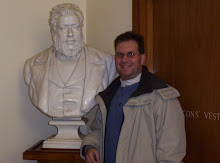I must confess that despite being a thirty-something minister with some degree of professional curiosity, and I assume at least average intelligence, I have struggled to develop a working understanding of the Emergent/Emerging church trend. If you find yourself in a similar predicament you might want to pick up Why We’re Not Emergent (By Two Guys Who Should Be).
Pastor Kevin DeYoung and moderately hip sportswriter Ted Kluck team up to write a compelling and engaging discussion of “the what” and “what’s wrong” of the movement. The book certainly helped me to consolidate the lose pieces of emergent understanding that I had gathered over the years. In my mind, the two strongest chapters were a reconsideration of the alleged evils of modernism (Kevin, chapter 7) and reflection on what new community really looks like (Ted, chapter 10).
It may be that the most useful critique of the movement was the call to replace “versus” with “and”.
“They pit information versus transformation, believing versus belonging, and propositions about Christ versus the person of Christ. The emerging church will be a helpful corrective against real, and sometimes perceived, abuses in evangelicalism when they discover the genius of the “and,” and stop forcing us to accept half-truths.” (page 75)
Overall, the tone of the book remained friendly. In fact, while the book confirmed that I remained more immersed than emerged, I am challenged to be certain that our church does not feed any of the more legitimate concerns that inspired the emergent movement (“emergment” anyone?) to grow.
Pastor Kevin DeYoung and moderately hip sportswriter Ted Kluck team up to write a compelling and engaging discussion of “the what” and “what’s wrong” of the movement. The book certainly helped me to consolidate the lose pieces of emergent understanding that I had gathered over the years. In my mind, the two strongest chapters were a reconsideration of the alleged evils of modernism (Kevin, chapter 7) and reflection on what new community really looks like (Ted, chapter 10).
It may be that the most useful critique of the movement was the call to replace “versus” with “and”.
“They pit information versus transformation, believing versus belonging, and propositions about Christ versus the person of Christ. The emerging church will be a helpful corrective against real, and sometimes perceived, abuses in evangelicalism when they discover the genius of the “and,” and stop forcing us to accept half-truths.” (page 75)
Overall, the tone of the book remained friendly. In fact, while the book confirmed that I remained more immersed than emerged, I am challenged to be certain that our church does not feed any of the more legitimate concerns that inspired the emergent movement (“emergment” anyone?) to grow.






No comments:
Post a Comment